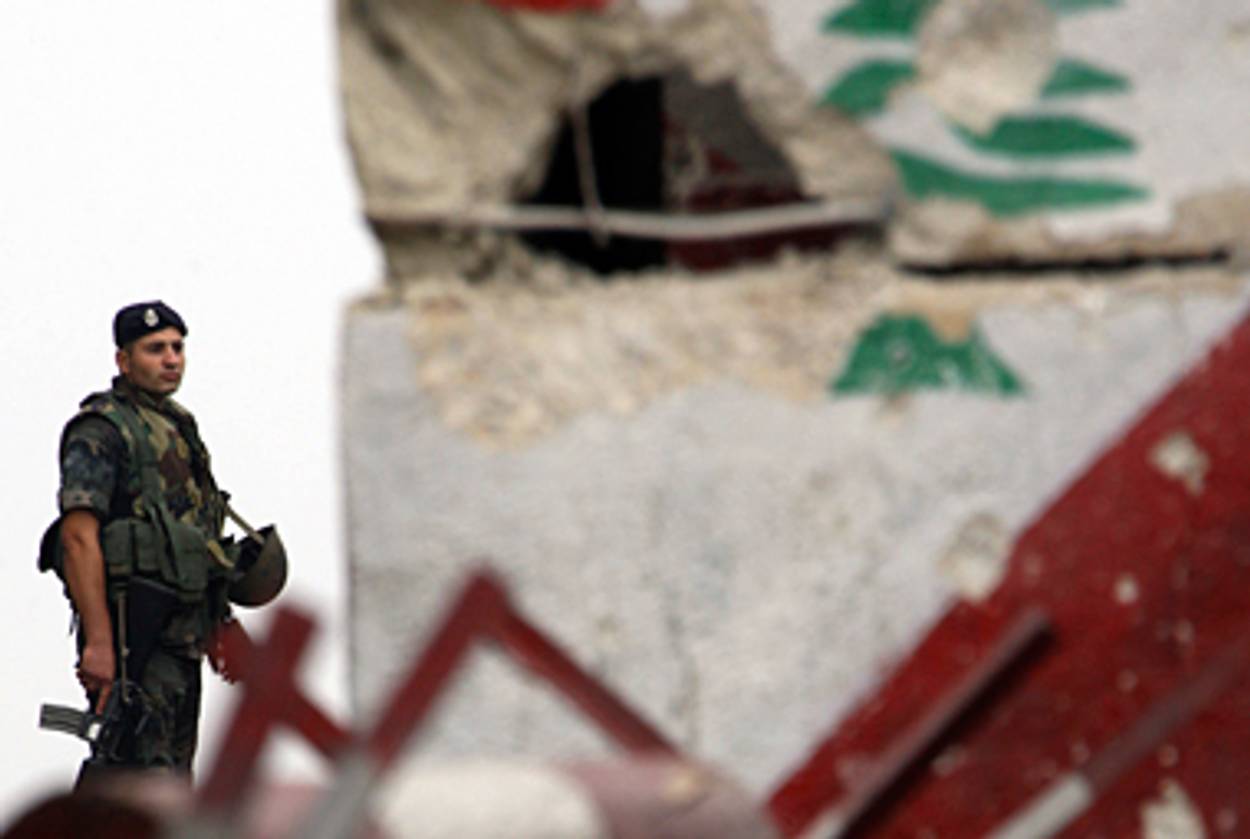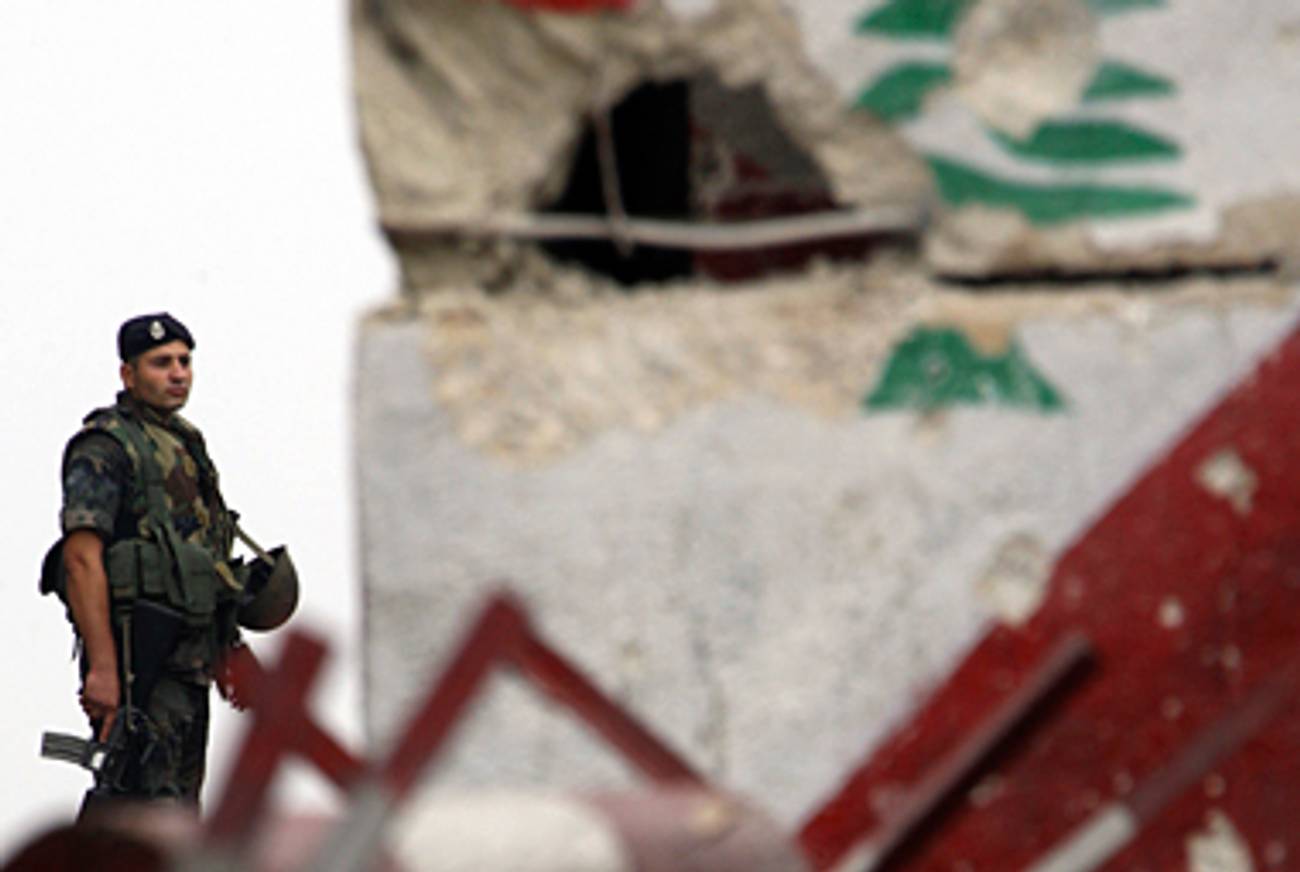The Guns of August
Is U.S. military aid to Lebanon being used against Israel?




Even to the untrained eye, there was something disturbing about the images flowing in from the Israeli-Lebanese border clash on Tuesday, which left one senior Israeli officer and three Lebanese dead. The pictures speak for themselves: Freshly uniformed Lebanese soldiers, armed with U.S.-made M-16s and backed by U.S.-made M113 armored personnel carriers, can be clearly seen firing at Israeli soldiers who are standing on Israeli territory. Given the generous military aid that Lebanon has been receiving from the United States in recent years—aid that included sophisticated sniper rifles of the kind that may have been used to target and kill the Israeli officer, Lt. Col. Dov Harari—one cannot ignore the possibility that the same U.S. weapons intended to help stabilize Lebanon and secure the northern Israeli border may be having the opposite effect.
As a result, Israel—which has long concerned itself with preventing the sale of strategic U.S. weaponry such as F-15s to competing regional powers like Egypt and Saudi Arabia in order to maintain its qualitative military advantage in the region—has begun to turn its attention to the relatively small and historically ineffective Lebanese army on its northern border. In his first public interview since the deadly incident, Defense Minister Ehud Barak called on Washington to halt the supply of advanced weapons to Lebanon, and referred to continued arming of the Lebanese Army “a mistake.”
“We always feared that these weapons could end up in the hands of Hezbollah,” Barak explained on Israeli radio, “but now we are witnessing a reality far more troubling in which these weapons are being used directly against us by the Lebanese forces.” Jerusalem has become so alarmed, Haaretz reports, that it is now planning to launch a diplomatic blitz to convince the United States (and France) to cease arms shipments to Beirut.
So far, the complaints seem to have fallen on deaf ears. After an initial comment that sought to put the blame for the attack on both sides, U.S. Assistant Secretary of State Philip Crowley declared on Wednesday that “the firing by Lebanese Armed Forces was wholly unjustified and unwarranted”—but added that the incident is not expected to hinder U.S. aid to Lebanon. “We are committed to Israel’s security, but we’re also committed to Lebanese sovereignty,” he said. “These interests are not mutually exclusive. They’re not in contradiction.”
Or are they? As Tuesday’s deadly incident worrisomely reveals, the task of establishing Lebanese sovereignty may not only endanger Israeli security, but may actually do so with the help of U.S. arms.
In an address after the incident, Hezbollah’s leader, Hassan Nasrallah, attempted to suggest that the Lebanese army and Hezbollah were working together. “The army guards the Resistance, and the Resistance guards the army,” Nasrallah explained, before shouting that his militiamen “would not sit with arms crossed, and the Israeli hand outstretched to strike the Lebanese military will be cut off by the Resistance.” Nasrallah’s remarks were given some substance by reports that the commander of the Lebanese unit that opened fire was a Shiite who was close to local Hezbollah commanders, raising questions about whether arms provided to the Lebanese Armed Forces in the south are under the control of the national Lebanese government or Hezbollah.
Ever since the Second Lebanon War in 2006, the United States has accelerated—with the support of Israel—its efforts to beef up the Lebanese Army in the hopes that it might grow strong enough one day to fulfill the mandate granted it by Security Council resolution 1701 and help the country’s weak and divided central government exercise legitimate sovereignty throughout the country. According to a 2009 congressional report, more than $600 million worth of U.S. military aid had poured into Lebanon between 2005 and 2009. A strong Lebanese army would strengthen pro-Western forces in Lebanon and weaken Hezbollah—or so U.S. policymakers hoped.
That the George W. Bush administration’s policy of promoting democracy in Lebanon with gifts of U.S.-made weapons has been adopted by the current administration became evident when Vice President Joe Biden arrived in Beirut in May of last year bearing still more gifts: At an airport press conference, he introduced an impressive array of new U.S. armaments including helicopters, tanks, and artillery. “We believe it’s critical that you be able to do your mission and protect the citizens and state of Lebanon—one army, one police power, one capability controlling your whole country,” Biden told his hosts.
As in Iraq and Afghanistan, Washington’s efforts to strengthen Beirut’s flaccid central government involve a calculated risk. Lebanon is a divided society, where Christians, Druze, Sunnis, and Shiites have historically (and ferociously) fought for power. The 70,000-man national army reflects the country’s motley assortment of ethnic identities and blood feuds all too well. If and when its members shall be called upon to decide where their loyalty lies—with the Beirut government or with Hassan Nasrallah or local sheiks—one fears that they will do as they have often done in Lebanon’s past, and opt for their communal leaders over the divided national government, taking their U.S.-made tanks, helicopters, and artillery with them.
Especially alarming are recent estimates that about 60 percent of the Lebanese army and a third of its officer corps are Shiites, whose communal champion is Hezbollah. In case of another Hezbollah war with Israel—an ever-increasing possibility—it seems highly improbable that thousands of Shiite soldiers deployed throughout southern Lebanon and well equipped with brand-new U.S. weapons will sit still, as U.S. policymakers have assumed. Instead, what Tuesday’s events suggest is that they will pick up their U.S. weapons, and turn them against one of the closest U.S. allies.
Yoav Fromer teaches politics and history at Tel Aviv University.
Yoav Fromer teaches politics and history at Tel Aviv University.